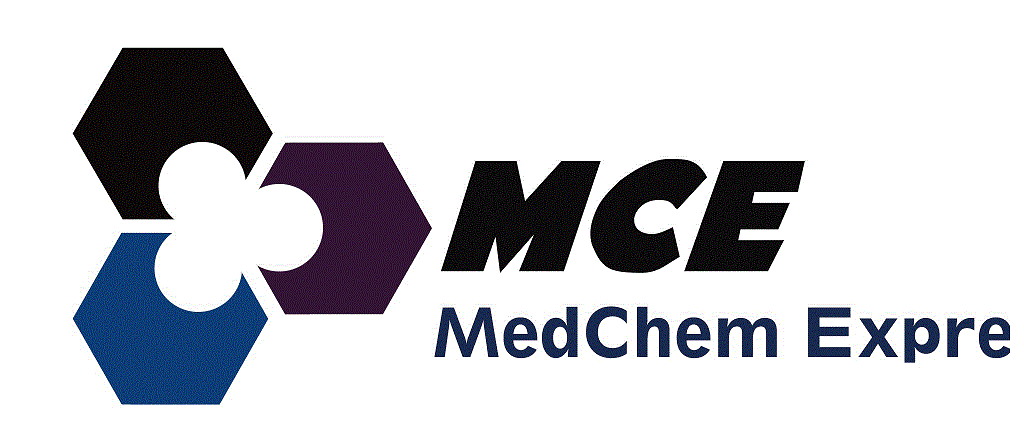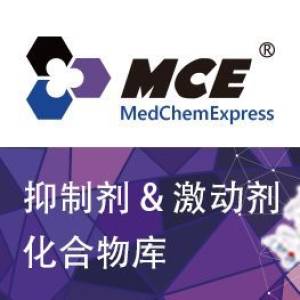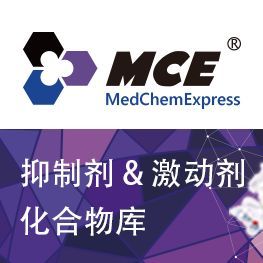MedChem Express
LC3B Antibody is a non-conjugated and Rabbit origined polyclonal antibody about 15 kDa, targeting to LC3B. It can be used for WB,ICC/IF,IHC-F,IHC-P assays with tag free, in the background of Human, Mouse, Rat.
More Information
Supplier Page
MedChem Express
LC3B Antibody is a non-conjugated and Rabbit origined polyclonal antibody about 15 kDa, targeting to LC3B. It can be used for WB,ICC/IF,IHC-F,IHC-P assays with tag free, in the background of Human, Mouse, Rat.
More Information
Supplier Page
MedChem Express
LC3B Antibody is a non-conjugated and Rabbit origined polyclonal antibody about 15 kDa, targeting to LC3B. It can be used for WB,ICC/IF,IHC-F,IHC-P assays with tag free, in the background of Human, Mouse, Rat.
More Information
Supplier Page
MedChem Express
LCB 03-0110, a thienopyridine derivative, is a potent pan-discoidin domain receptor/c-Src family tyrosine kinase inhibitor. LCB 03-0110 suppresses scar formation by inhibiting fibroblast and macrophage activation[1].
More Information
Supplier Page
MedChem Express
LCB 03-0110 dihydrochloride is a dihydrochloride of LCB 03-0110. LCB 03-0110 is a potent inhibitor of Src family tyrosine kinase[1].
More Information
Supplier Page
MedChem Express
LCI peptide is an antimicrobial peptide with antibacterial activity. LCI peptide is active against plant pathogens, Xanthomonas and Pseudomonas, including E. coli, Gentamicin-resistant MRSA and Xoo[1].
More Information
Supplier Page
MedChem Express
Lck Antibody (YA712) is a non-conjugated and Mouse origined monoclonal antibody about 58 kDa, targeting to Lck (3E5). It can be used for WB assays with tag free, in the background of Human.
More Information
Supplier Page
MedChem Express
Lck Antibody (YA712) is a non-conjugated and Mouse origined monoclonal antibody about 58 kDa, targeting to Lck (3E5). It can be used for WB assays with tag free, in the background of Human.
More Information
Supplier Page
MedChem Express
Lck Antibody (YA712) is a non-conjugated and Mouse origined monoclonal antibody about 58 kDa, targeting to Lck (3E5). It can be used for WB assays with tag free, in the background of Human.
More Information
Supplier Page
MedChem Express
Lck Inhibitor III (compound 12h) is a potent Lck inhibitor, with an IC50 of 867 nM. Lck Inhibitor III inhibits IL-2 synthesis in Jurkat cells, with an IC50 of 1.270 μM[1].
More Information
Supplier Page
MedChem Express
LCMV-derived p13 epitope is a biological active peptide. (An H-2Db restricted epitope, this peptide is amino acids 61 to 80 fragment of the lymphocytic choriomeningitis virus (LCMV) pre-glycoprotein polyprotein GP complex. LCMV has been routinely used for the study of adaptive immune responses to viral infection.)
More Information
Supplier Page
MedChem Express
MedChem Express
LD-ATTEC3 is a lipid droplet-binding compound that can be used in the study of lipid metabolism-related diseases[1].
More Information
Supplier Page
MedChem Express
LD-ATTEC4 (compound 4A) is a coupling compound that can bind to LC3, with a Kd of 0.39 μM for LC3B. LD-ATTEC4 can connect autophagosomes with lipid droplets, inducing autophagy to clear lipid droplets[1].
More Information
Supplier Page
MedChem Express
LDH-IN-2, a salicylic acid derivative, is an inhibitor of glycolate oxidase (GO). LDH-IN-2 decreases oxalate output in hyperoxaluric hepatocytes. LDH-IN-2 can be used for research of primary hyperoxaluria type 1 (PH1)[1].
More Information
Supplier Page
MedChem Express
LDLR Antibody is an unconjugated, approximately 92 kDa, rabbit-derived, anti-LDLR polyclonal antibody. LDLR Antibody can be used for: WB, ELISA, Flow-Cyt, ICC expriments in human, mouse, and predicted: rat, dog, pig, cow, horse, rabbit, guinea pig background without labeling.
More Information
Supplier Page
MedChem Express
LDN 193188 is a phosphatidylcholine transfer protein (PC-TP) inhibitor. LDN 193188 regulates hepatic glucose metabolism, and can be used for study of glucose metabolism[1].
More Information
Supplier Page
MedChem Express
LDN-193189 (dihydrochloride) is a potent selective BMP type I receptor (BMP I) inhibitor. LDN-193189 efficiently inhibits transcriptional activity of the BMP type I receptors ALK2 and ALK3 with IC50 values of 5 nM and 30 nM, respectively. LDN-193189 can be used for the research of bone morphogenetic protein signalling, such as fibrodysplasia ossificans progressiva[1][2][3].
More Information
Supplier Page
MedChem Express
LDN-193189 (dihydrochloride) is a potent selective BMP type I receptor (BMP I) inhibitor. LDN-193189 efficiently inhibits transcriptional activity of the BMP type I receptors ALK2 and ALK3 with IC50 values of 5 nM and 30 nM, respectively. LDN-193189 can be used for the research of bone morphogenetic protein signalling, such as fibrodysplasia ossificans progressiva[1][2][3].
More Information
Supplier Page
MedChem Express
LDN-193189 (dihydrochloride) is a potent selective BMP type I receptor (BMP I) inhibitor. LDN-193189 efficiently inhibits transcriptional activity of the BMP type I receptors ALK2 and ALK3 with IC50 values of 5 nM and 30 nM, respectively. LDN-193189 can be used for the research of bone morphogenetic protein signalling, such as fibrodysplasia ossificans progressiva[1][2][3].
More Information
Supplier Page
MedChem Express
LDV-FITC, a fluorescent peptide, is a FITC-conjugated LDV peptide (HY-P2267). LDV-FITC binds to the α4β1 integrin with high affinity (Kd: 0.3 nM and 12 nM for binding to U937 cells in the presence and absence of Mn2+ respectively). LDV-FITC can be used to detect α4β1 integrin affinity[1][2].
More Information
Supplier Page
MedChem Express
LE 28 is a selective and activity-dependent legumain probe. LE 28 becomes fluorescent only upon binding active legumain. LE 28 can be used for research of cancers and inflammatory diseases[1].
More Information
Supplier Page
MedChem Express
MedChem Express
Lecimibide (DuP 128) is a potent and specific acyl-CoA:cholesterol acyltransferase (ACAT) inhibitor for antihyperlipidemia research[1][2].
More Information
Supplier Page
MedChem Express
Lecithin (Standard) is the analytical standard of Lecithin. This product is intended for research and analytical applications. Lecithin is regarded as a safe, conventional phospholipid source. Phospholipids are reported to alter the fatty acid composition and microstructure of the membranes in animal cells.
More Information
Supplier Page
MedChem Express
Lecithin (Standard) is the analytical standard of Lecithin. This product is intended for research and analytical applications. Lecithin is regarded as a safe, conventional phospholipid source. Phospholipids are reported to alter the fatty acid composition and microstructure of the membranes in animal cells.
More Information
Supplier Page
MedChem Express
Lecithin (Standard) is the analytical standard of Lecithin. This product is intended for research and analytical applications. Lecithin is regarded as a safe, conventional phospholipid source. Phospholipids are reported to alter the fatty acid composition and microstructure of the membranes in animal cells.
More Information
Supplier Page
MedChem Express
Lecithins, egg can be used as an excipient. Pharmaceutical excipients, or pharmaceutical auxiliaries, refer to other chemical substances used in the pharmaceutical process other than pharmaceutical ingredients. Pharmaceutical excipients generally refer to inactive ingredients in pharmaceutical preparations, which can improve the stability, solubility and processability of pharmaceutical preparations. Pharmaceutical excipients also affect the absorption, distribution, […]
More Information
Supplier Page
MedChem Express
Ledelabricin alfa is a human proteoglycan 4 (PRG4) isoform A variant. PRG4 is a joint/boundary lubricant. Ledelabricin Alfa can be used for the research arthropathy[1].
More Information
Supplier Page
MedChem Express
Ledol ((+)-Ledol) is an antifungal agent that can be isolated from the essential oil fractions of Rhododendron tomentosum. Ledol is also the expectorant and antitussive agent, which is simultaneously responsible for adverse reactions such as dizziness, nausea and vomiting[1].
More Information
Supplier Page
MedChem Express
Ledol ((+)-Ledol) is an antifungal agent that can be isolated from the essential oil fractions of Rhododendron tomentosum. Ledol is also the expectorant and antitussive agent, which is simultaneously responsible for adverse reactions such as dizziness, nausea and vomiting[1].
More Information
Supplier Page
MedChem Express
Ledol ((+)-Ledol) is an antifungal agent that can be isolated from the essential oil fractions of Rhododendron tomentosum. Ledol is also the expectorant and antitussive agent, which is simultaneously responsible for adverse reactions such as dizziness, nausea and vomiting[1].
More Information
Supplier Page
MedChem Express
LEI-515 is a first-in-class peripherally restricted, reversible MAGL inhibitor. LEI-515 increases 2-AG levels in peripheral organs, but not mouse brain. LEI-515 attenuated liver necrosis, oxidative stress and inflammation in a CCl4-induced acute liver injury model[1].
More Information
Supplier Page
MedChem Express
LEM-14-1189, a LEM-14 (HY-114340) derivative, is a NSDs inhibitor with IC50s of 418 μM (NSD1), 111 μM (NSD2), and 60 μM (NSD3), respectively. The NSDs, histone lysine methyltransferases (HMTases), are oncoproteins, drivers of a number of tumors. LEM-14-1189 can be used for multiple myeloma (MM) research[1].
More Information
Supplier Page
MedChem Express
Lemalesomab (IMMU-MN3) is a mouse IgG1 Anti-NCA-90 monoclonal antibody and a Fab’fragment. Lemalesomab can be used for the research of inflammation, infectious lesions and infection imaging[1].
More Information
Supplier Page
MedChem Express
Lenalidomide 4′-alkyl-C3-azide (compound 4a) is a click chemical modified Lenalidomide (HY-A0003) that can be used to synthesize PROTACs. Lenalidomide is an orally active immunomodulator and a ligand for the ubiquitin E3 ligase cereblon (CRBN). Lenalidomide 4′-alkyl-C3-azide contains an Azide group and can undergo copper-catalyzed azide-alkyne cycloaddition reaction (CuAAc) with molecules containing Alkyne groups. Strain-promoted alkyne-azide […]
More Information
Supplier Page
MedChem Express
Lenalidomide 4′-alkyl-C5-azide is a functionalized cerebellar ligand for PROTAC development that contains an E3 ligand and an alkyl LC5 ligand with terminal azides that can be coupled to a target protein ligand[1].
More Information
Supplier Page
MedChem Express
Lenalidomide 4′-PEG1-amine dihydrochloride is the Lenalidomide-based Cereblon ligand used in the recruitment of CRBN protein. Lenalidomide 4′-PEG1-amine dihydrochloride can be connected to the ligand for protein by a linker to form PROTAC[1].
More Information
Supplier Page
MedChem Express
Lenalidomide 4′-PEG1-azide (Compound 4g) is a lenalidomide-derived azide. Lenalidomide 4′-PEG1-azide incorporates the Lenalidomide based cereblon ligand and a linker. Lenalidomide 4′-PEG1-azide is a click chemistry reagent, it contains an Azide group and can undergo copper-catalyzed azide-alkyne cycloaddition reaction (CuAAc) with molecules containing Alkyne groups. Strain-promoted alkyne-azide cycloaddition (SPAAC) can also occur with molecules containing DBCO […]
More Information
Supplier Page
MedChem Express
Lenalidomide 4′-PEG2-amine dihydrochloride is the Lenalidomide-based Cereblon ligand used in the recruitment of CRBN protein. Lenalidomide 4′-PEG2-amine dihydrochloride can be connected to the ligand for protein by a linker to form PROTAC[1].
More Information
Supplier Page
MedChem Express
Lenalidomide 4′-PEG2-azide is the Lenalidomide-based Cereblon ligand used in the recruitment of CRBN protein. Lenalidomide 4′-PEG2-azide can be connected to the ligand for protein by a linker to form PROTAC[1].
More Information
Supplier Page
MedChem Express
Lenalidomide 4′-PEG3-amine dihydrochloride is the Lenalidomide-based Cereblon ligand used in the recruitment of CRBN protein. Lenalidomide 4′-PEG3-amine dihydrochloride can be connected to the ligand for protein by a linker to form PROTAC[1].
More Information
Supplier Page
MedChem Express
Lenalidomide-acetylene-Br is a PROTAC Linker taht makes up HJM-561 (HY-156698). HJM-561 is a potent, selective, and orally active EGFR PROTAC to inhiibit Osimertinib (HY-15772)-resistant EGFR triple mutations.
More Information
Supplier Page
MedChem Express
Lenalidomide-C5-acid is the Lenalidomide-based E3 ligase ligand-linker conjugate used in the recruitment of CRBN protein. Lenalidomide-C5-acid can be used to synthesize PROTACs[1].
More Information
Supplier Page
MedChem Express
Lenalidomide-C5-acid is the Lenalidomide-based E3 ligase ligand-linker conjugate used in the recruitment of CRBN protein. Lenalidomide-C5-acid can be used to synthesize PROTACs[1].
More Information
Supplier Page
MedChem Express
Lenalidomide-C5-acid is the Lenalidomide-based E3 ligase ligand-linker conjugate used in the recruitment of CRBN protein. Lenalidomide-C5-acid can be used to synthesize PROTACs[1].
More Information
Supplier Page
MedChem Express
Lenapenem (BO-2727 free acid), a carbapenem antibiotic, has potent antibacterial activity against Gram-positive and Gram-negative bacteria including P. aeruginosa[1].
More Information
Supplier Page
MedChem Express
Lenercept (Ro 45-2081) is a recombinant fusion protein that consists of the soluble TNF-receptor (p55) linked to the Fc portion of human IgG1[1].
More Information
Supplier Page
MedChem Express
Leniolisib (CDZ173) phosphate is a potent and selective PI3Kδ inhibitor. Leniolisib phosphate has the potential for immunodeficiency disorders treatment.
More Information
Supplier Page
MedChem Express
Leniolisib (CDZ173) phosphate is a potent and selective PI3Kδ inhibitor. Leniolisib phosphate has the potential for immunodeficiency disorders treatment.
More Information
Supplier Page




